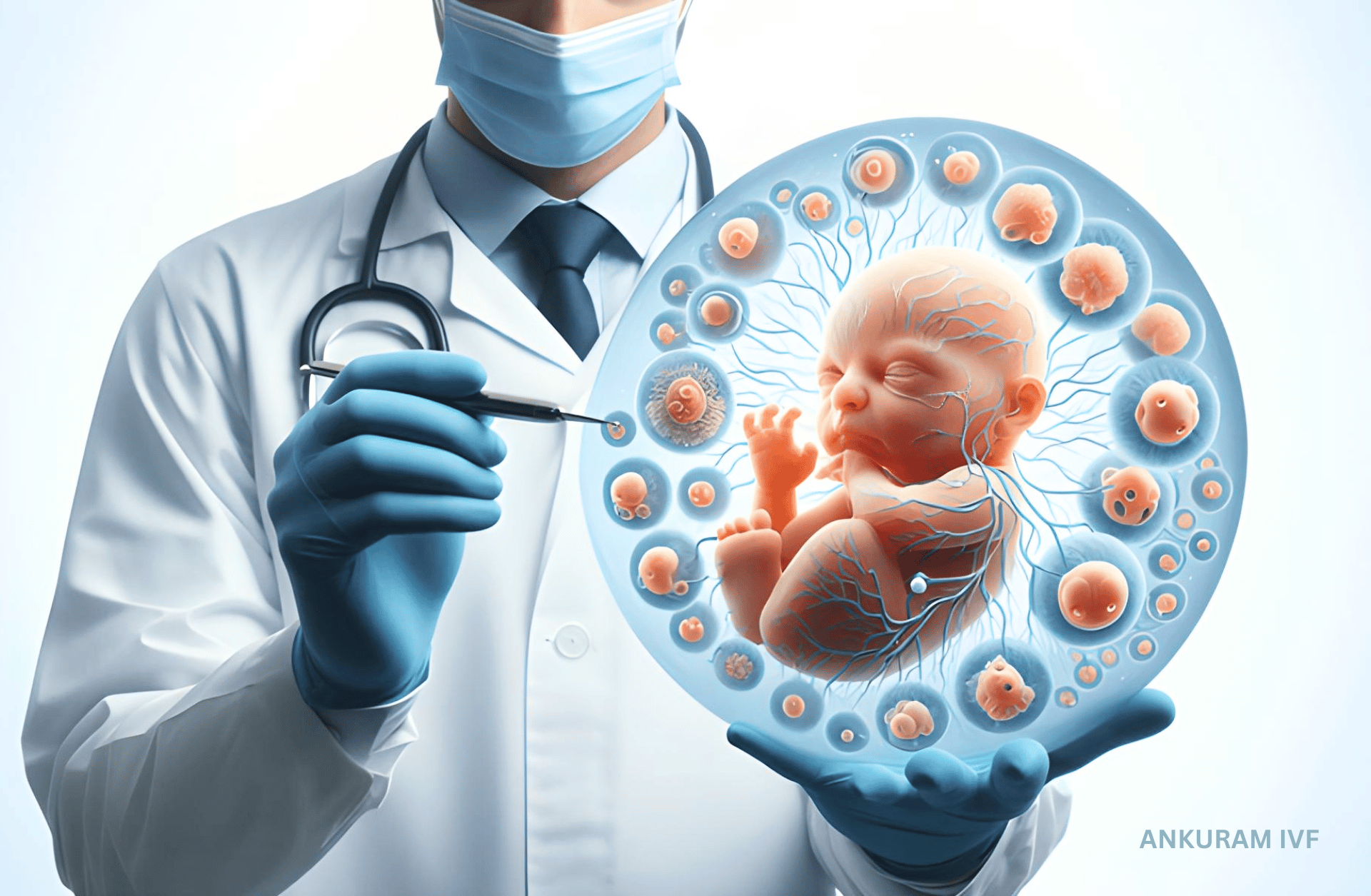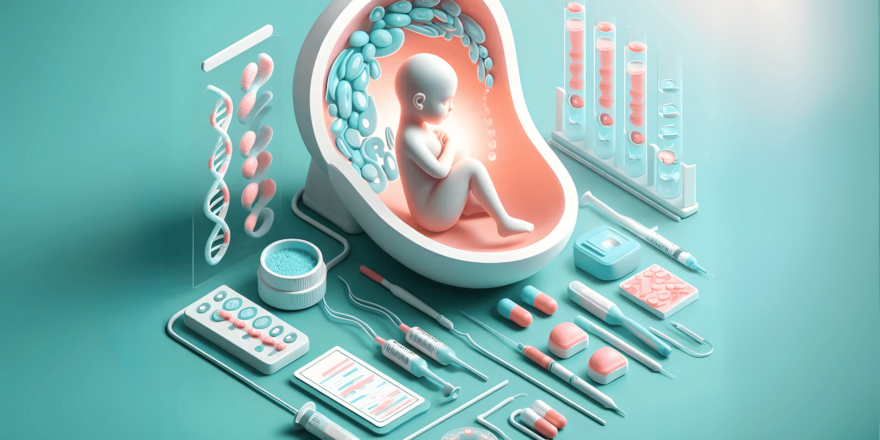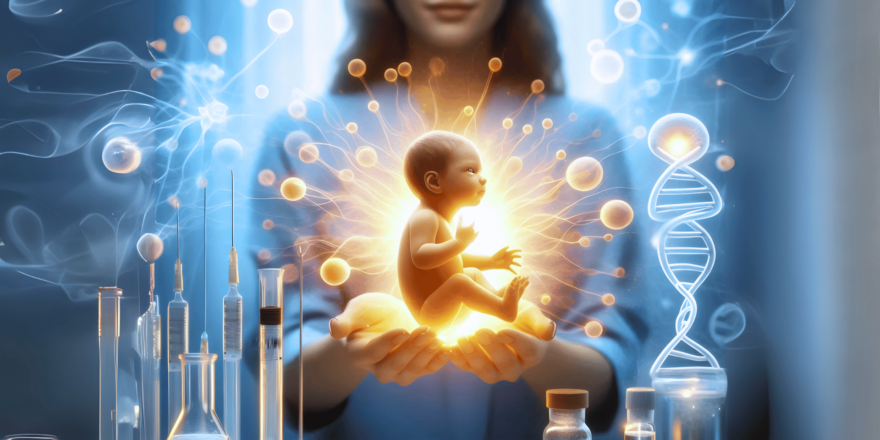Introduction: The Significance of World IVF Day
World IVF Day, celebrated annually on July 25th, marks a pivotal moment in medical history – the birth of Louise Brown, the world’s first “test-tube baby,” in 1978. This groundbreaking event revolutionized the field of reproductive medicine and offered hope to millions of couples struggling with infertility. As we commemorate World IVF Day in 2024, we reflect on the tremendous progress made in In Vitro Fertilization (IVF) and its profound impact on families worldwide.
At ANKURAM IVF, we recognize the importance of this day as an opportunity to celebrate the advancements in fertility treatment, honor the dedicated professionals in the field, and raise awareness about infertility and the options available to those facing reproductive challenges. In this comprehensive blog post, we’ll explore the history of IVF, highlight significant milestones, discuss current challenges, and look toward the future of this life-changing technology.
A Brief History of IVF
The journey of IVF began long before Louise Brown’s birth in 1978. Let’s take a brief look at the key events that paved the way for this revolutionary fertility treatment:
- 1878: First documented mammalian embryo transfer in rabbits.
- 1934: Pincus and Enzmann perform the first IVF experiments in rabbits.
- 1944: Rock and Menkin achieve the first human IVF, though the embryos fail to develop.
- 1969: Edwards, Steptoe, and Purdy fertilize the first human egg in vitro.
- 1978: Birth of Louise Brown, the first “test-tube baby”
The success of Louise Brown’s birth marked a turning point in reproductive medicine. It demonstrated that conception could occur outside the human body, offering hope to countless individuals and couples struggling with infertility. Since then, IVF has undergone numerous refinements and improvements, becoming an increasingly successful and accessible fertility treatment option.
The Evolution of IVF Technology
Since its inception, IVF has evolved dramatically, incorporating new technologies and techniques to improve success rates and patient experiences. Some key developments include:
- Intracytoplasmic Sperm Injection (ICSI): Introduced in 1992, ICSI allows for the direct injection of a single sperm into an egg, revolutionizing treatment for male factor infertility.
- Preimplantation Genetic Testing (PGT): This technique, developed in the 1990s, enables the screening of embryos for genetic disorders before implantation.
- Vitrification: An ultra-rapid freezing technique that significantly improves the survival rate of cryopreserved eggs and embryos.
- Time-lapse Embryo Monitoring: This technology allows for continuous observation of embryo development without disturbing the culture environment.
- Artificial Intelligence in Embryo Selection: Machine learning algorithms are being developed to assist in identifying the most viable embryos for transfer.
These advancements, among others, have contributed to steadily improving IVF success rates and have expanded the range of fertility issues that can be addressed through assisted reproductive technology.
10 Inspiring Milestones in IVF
As we celebrate World IVF Day, let’s reflect on ten significant milestones that have shaped the field of IVF and continue to inspire hope for those seeking fertility treatment:
- Birth of Louise Brown (1978): The world’s first “test-tube baby,” marking the success of IVF in humans.
- First IVF Baby Born in the United States (1981): Elizabeth Carr’s birth demonstrated the global potential of IVF technology.
- Introduction of ICSI (1992): This technique revolutionized treatment for male factor infertility.
- First Successful Egg Freezing Pregnancy (1986): Opened new possibilities for fertility preservation.
- Birth of First “Savior Sibling” (2000): IVF and PGT were used to conceive a child who could provide stem cells to treat an older sibling’s genetic disorder.
- First Birth from a Transplanted Ovary (2004): Demonstrated new possibilities for fertility preservation in cancer patients.
- Birth of the First Baby from a Vitrified Egg (2005): Marked a significant improvement in egg freezing technology.
- Mitochondrial Donation Approved in the UK (2015): Allowed for the prevention of mitochondrial diseases through IVF.
- Birth of the World’s First “Three-Parent Baby” (2016): Using mitochondrial donation to prevent genetic disease transmission.
- AI-Assisted Embryo Selection (2019): The integration of artificial intelligence in IVF marks a new era of precision medicine in fertility treatment.
Each of these milestones represents a leap forward in our ability to assist individuals and couples in their journey to parenthood. They serve as reminders of the incredible progress made in the field of reproductive medicine and the ongoing potential for innovation.
Embryologists: The Unseen Artisans of IVF
On World IVF Day, as we celebrate the millions of lives brought into the world through assisted reproduction, it’s important to recognize the dedicated professionals working behind the microscope. Embryologists, with their unique blend of scientific expertise, technical skill, and compassionate care, are truly the unseen artisans of IVF. Their work not only creates life but also hope, turning the dreams of parenthood into reality for countless individuals and couples around the world. As we celebrate World IVF Day, it’s essential to shine a spotlight on the unsung heroes of assisted reproductive technology: embryologists. These highly skilled professionals play a pivotal role in the intricate process of In Vitro Fertilization (IVF), working tirelessly behind the scenes to bring the miracle of life to countless families struggling with infertility.
10 Incredible Ways Embryologists Create Miracles in IVF
Embryologists are specialized scientists with advanced degrees in fields such as biology, genetics, or reproductive science. Their expertise spans a wide range of disciplines, including cellular biology, genetics, and cutting-edge laboratory techniques. This multifaceted knowledge is crucial for navigating the complex world of assisted reproduction.
- Gamete Handling and Preparation: Embryologists begin their work even before fertilization occurs. They meticulously prepare sperm samples, often using techniques like sperm washing to isolate the healthiest and most motile sperm. For eggs, they carefully assess each oocyte retrieved from the patient, identifying those that are mature and suitable for fertilization.
- Fertilization – Where Science Meets Life: The fertilization stage is where embryologists truly showcase their skills. They may employ traditional insemination methods, where sperm and eggs are combined in a culture dish, or use more advanced techniques like Intracytoplasmic Sperm Injection (ICSI). ICSI requires exceptional precision, as the embryologist must select a single sperm and inject it directly into the egg using a microscopic needle.
- Embryo Culture and Monitoring: Once fertilization occurs, embryologists become guardians of the developing embryos. They create and maintain optimal laboratory conditions that mimic the natural environment of the female reproductive tract. Using state-of-the-art incubators and culture media, they nurture the embryos through their crucial early stages of development.
- Time-Lapse Imaging and Assessment: Modern IVF laboratories often employ time-lapse imaging systems, allowing embryologists to monitor embryo development continuously without disturbing the culture environment. This technology provides valuable insights into embryo quality and viability, helping embryologists select the most promising candidates for transfer.
- Genetic Testing Procedures: For patients opting for genetic screening, embryologists perform delicate embryo biopsies. They skillfully remove a few cells from each embryo for genetic analysis, a process that requires steady hands and exceptional precision to avoid damaging the embryo.
- Cryopreservation: Embryologists are also experts in cryopreservation techniques. They freeze surplus embryos, eggs, or sperm for future use, employing advanced vitrification methods to ensure high survival rates upon thawing.
- Embryo Transfer: On the day of embryo transfer, embryologists work closely with fertility specialists to select the best embryo(s) for transfer. They carefully load the chosen embryo(s) into a catheter, a process that demands utmost care and precision.
- The Laboratory: A Controlled Microenvironment: The IVF laboratory is a tightly controlled environment, and maintaining its integrity is a critical part of an embryologist’s role. They must: Monitor and adjust temperature, humidity, and gas levels to create optimal conditions for embryo development. Maintain strict cleanliness and sterility protocols to prevent contamination. Regularly calibrate and maintain sophisticated equipment like incubators, microscopes, and imaging systems. Implement quality control measures to ensure consistency and reliability in all procedures.
- Continuous Learning and Innovation: The field of reproductive medicine is rapidly evolving, and embryologists must stay at the forefront of new developments. They regularly attend conferences, participate in research, and undergo continuous training to master new techniques and technologies. From artificial intelligence in embryo selection to advancements in genetic testing, embryologists are often at the cutting edge of reproductive science.
- The Human Touch in a High-Tech Field: While much of their work involves sophisticated technology, embryologists also play a crucial role in patient care. They often interact with patients, explaining complex scientific procedures in understandable terms and providing updates on embryo development. This ability to bridge the gap between advanced science and human experience is a unique and valuable aspect of their role. Embryologists frequently face complex ethical decisions. They must navigate issues such as embryo selection, genetic testing, and the handling of surplus embryos with sensitivity and in accordance with ethical guidelines and legal regulations.

The Future of IVF: Emerging Technologies and Trends
As we look to the future on this World IVF Day, several exciting developments are on the horizon that promise to further revolutionize fertility treatment:
- Artificial Gametes: Research is progressing on creating sperm and eggs from stem cells, potentially offering new options for individuals unable to produce their own gametes.
- Artificial Wombs: While still in early stages, this technology could potentially help extremely premature babies and open new possibilities for reproductive medicine.
- CRISPR Gene Editing: This powerful tool for editing DNA could potentially be used to correct genetic disorders in embryos, though it raises significant ethical concerns.
- Improved Embryo Selection: Advances in time-lapse imaging, metabolomics, and AI are enhancing our ability to select the most viable embryos for transfer.
- Personalized Medicine in IVF: Genetic testing and big data analytics are paving the way for more individualized treatment protocols.
- Fertility Preservation Advancements: Improved techniques for egg, sperm, and ovarian tissue freezing are expanding options for fertility preservation.
- Non-Invasive PGT: Research is ongoing to develop methods for genetic testing of embryos without the need for biopsy.
- Microfluidic IVF: This emerging technology aims to more closely mimic the natural environment of fertilization and early embryo development.
- Mitochondrial Replacement Therapy: Refinement of this technique could help prevent the transmission of mitochondrial diseases.
- Uterus Transplantation: This experimental procedure offers hope for women with absolute uterine factor infertility.
While these advancements hold great promise, it’s crucial that their development and implementation are guided by careful scientific scrutiny, ethical considerations, and regulatory oversight. At ANKURAM IVF, we remain committed to staying at the forefront of these innovations while ensuring the safety and well-being of our patients.
ANKURAM IVF: Our Commitment to Excellence in Fertility Treatment
As we celebrate World IVF Day, we at ANKURAM IVF reaffirm our commitment to providing exceptional, compassionate care to individuals and couples on their fertility journeys. Our approach is founded on several key principles:
- Cutting-Edge Technology: We invest in the latest advancements in reproductive technology to offer our patients the best possible chances of success.
- Personalized Care: We recognize that every patient’s journey is unique and tailor our treatment plans accordingly.
- Comprehensive Support: From financial counseling to emotional support, we strive to address all aspects of the fertility journey.
- Ethical Practice: We adhere to the highest ethical standards in all our procedures and decision-making processes.
- Continuous Learning: Our team is committed to ongoing education and research to stay at the forefront of reproductive medicine.
- Patient Education: We believe in empowering our patients with knowledge to make informed decisions about their treatment.
- Holistic Approach: We consider overall health and wellness in our treatment plans, not just reproductive factors.
- Transparency: We provide clear, honest communication about treatment options, success rates, and potential risks.
- Community Engagement: We actively participate in awareness and advocacy efforts to improve access to fertility treatments.
Our team of experienced fertility specialists, embryologists, nurses, and support staff work tirelessly to turn the dream of parenthood into reality for our patients. On this World IVF Day, we renew our dedication to this important mission.
Embracing Hope on World IVF Day
As we commemorate World IVF Day 2024, we celebrate the remarkable journey of IVF from a groundbreaking experiment to a widely accepted and successful fertility treatment. From Louise Brown’s birth in 1978 to the millions of IVF babies born since, each success story represents a triumph of science, dedication, and hope.
The field of reproductive medicine continues to evolve, offering new possibilities and hope to individuals and couples facing infertility. While challenges remain, including issues of access, and ethics.





2 thoughts on “Celebrating World IVF Day 2024: 10 Incredible Ways Embryologists Create Miracles in IVF”
Hey, Jack here. I’m hooked on your website’s content – it’s informative, engaging, and always up-to-date. Thanks for setting the bar high!
Noodlemagazine Very well presented. Every quote was awesome and thanks for sharing the content. Keep sharing and keep motivating others.